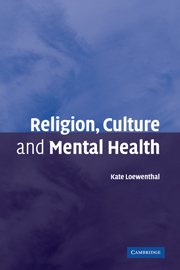3 - Manic disorder
Published online by Cambridge University Press: 22 September 2009
Summary
Definitions and causes of manic disorder
What are the relations between religion, culture and manic disorders?
The most common mood disorder is unipolar depression, discussed in chapter 4. It affects at least one person in ten at some point in their lifetime. At least one person in a hundred may suffer from bipolar or cyclothymic mood disorder, swinging from high to low moods, sometimes with intervening periods of ‘normal’ mood, which is neither unduly high nor low. The striking feature of bipolar disorders is mania, characterized by euphoric joy or well-being out of proportion to events and circumstances, plus at least some of the following (Comer, 1999):
Some irritability and anger, especially if plans are frustrated
Hyperactivity, seeking social and other activities
Going without sleep
Poor judgement, following own grandiose ideas and plans and feeling others are too slow
Self-esteem which approaches grandiosity
Flamboyance
Delusions or hallucinations.
In some forms of bipolar disorder (bipolar II), mania may be mild (hypomania), and in cyclothymic disorder the swings are not extreme, going from hypomania to mild depression. Unipolar mania is not now a recognised clinical or diagnostic category, unlike unipolar depression.
Religious factors and manic disorders
The argument that religion can contribute to psychotic breakdown is advanced by Yorston (2001). He suggests that the neuro-biological changes associated with meditative practices may contribute to a pathway which leads to the onset of mania. Wilson (1997) reached similar conclusions, finding that religion can be a precipitating factor in some affective (mood) disorders.
- Type
- Chapter
- Information
- Religion, Culture and Mental Health , pp. 49 - 54Publisher: Cambridge University PressPrint publication year: 2006



